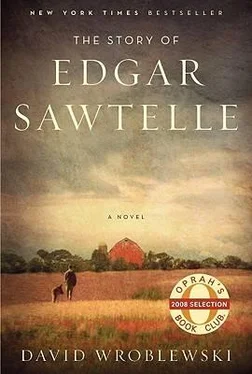But I want to learn! I can help.
“What if I said I wasn’t sure I could teach you what you need to know?”
You can. I know you can. I’ve been watching you all my life.
“Yes, you have. So why, at the age of nine months, does Tinder bolt whenever he gets a chance?”
That’s not fair!
“Who said anything about fair?” His mother’s voice cracked a little on the word. He could guess her thoughts: how exactly might the word “fair” apply to any part of their situation? Furthermore, what she’d said about his training skills was true. He was lazy and indulgent; what he liked was the attention of the pups, not the training. He was inconsistent. He worked them on skills they already knew and avoided more difficult things. Worst of all, he understood there was more he should be doing, but he had no idea what it was, and that made him feel ashamed.
“You need to realize that this is a business, like a grocery store or a gas station. You’re going to find out that’s an awfully cold-blooded view. You’re asking to be a partner in it. You’ll have to think of this place as a business first and a playground with dogs second.”
You’re talking down to me, he signed. I know what we do.
“Do you? What do you think we sell?”
He must have looked at her as if she were insane.
Dogs. Dogs, of course.
“Wrong. You see, Edgar? It’s not as obvious as you think. Anyone can sell dogs. People give them away. Do you know what we charge for each dog?”
He didn’t. His father had negotiated these things, and it wasn’t something he’d talked much about.
“One thousand five hundred dollars for a trained, eighteen-month-old dog.”
One thousand five hundred dollars?
“Yes,” she said. “Your litter could be worth between nine and ten thousand dollars. It’s not now, but it could be.”
How come we aren’t we rich?
She laughed. “Because most of that money goes toward food, medicine, and expenses. We reimburse people who take care of the older dogs. If we place twenty dogs a year, which is about what we average, we squeak by. And it’s not easy to find twenty people willing to pay that much for an adult dog. Most people want pups, you know.”
He nodded. Do other dogs cost that much?
“Some. A few cost more-litters out of show ring champions.” She rolled her eyes when she said “show ring”-her attitude about the dog fancy was just shy of total contempt. “Almost all dogs cost less, though. Much less.”
How can we charge so much?
“That’s exactly what you need to learn, Edgar. When you know the answer to that question, you’ll know why we can place our dogs at all, much less at that price. You’ll also understand what it is we’re selling.”
Can’t you just tell me?
“I could try, but there are no words for some things, Edgar. Let me ask you a question. You’ve been around plenty of dogs in town. Do they seem just like ours? Different color, different breed, but otherwise the same?”
Not exactly.
“Kind of scatterbrained, right?”
Yes. But they aren’t trained, most of them.
“Do you think that’s the only difference? Our pups mature more slowly, do you understand that? They don’t have their first heat until they are two years old. And when they are little…you know how frustrating they can be. Look at Essay. We were still working on simple obedience with her when she was six months old, long after any mutt would have that stuff down pat. But try doing a shared-gaze exercise with one of those town dogs and see what happens.”
But that’s easy!
She laughed and stood and turned on the radio to the country-western station she liked and they cleared the table. She hummed under her breath as they did the dishes, but it was not joyful-more like a person singing to keep her mind off something else. Before Edgar went to bed, his mother said one last thing.
“Edgar, think about what we discussed. Give it a while. Then we need to do one of two things. Either we stay and make this kennel work-and that is going to require you to learn finish training-or we begin dismantling the kennel. There’s no point in anything halfway.”
Edgar nodded. It sounded so rational, the alternatives so clear. He knew what he wanted the moment his mother posed her question, and he knew what she wanted him to want, despite her attempt at objectivity. Another life was inconceivable. It would be much later before he’d realize they’d seduced themselves that night-seduced themselves into believing they understood all the costs and consequences of what they wanted. That no mistake they might make could equal what had already happened. That their calm wasn’t simply a veneer.
SINCE THEY WERE IN TOWN ALREADY, Trudy decided they would eat lunch at the Mellen Diner. As soon as they were seated, Doctor Papineau hailed from across the room and Trudy walked over to him. Edgar sat listening to the lunchtime chatter and looking out the window. In the corner booth, a little girl was staring at him. A moment later she marched past, whispering in a quiet singsong, and disappeared into the bathroom. When he glanced back from the window he discovered her standing beside his booth.
“Hi,” she said. She was maybe five years old, dressed in a blue jumpsuit with a rainbow-colored elephant across the bib, her hair a yellow tangle of ringlets. She leaned toward him confidentially.
“Mama says you can’t talk,” she lisped. “Is that really true?”
He looked at her and nodded.
“Not even a whisper?”
He shook his head.
She drew back and gave him an appraising look.
“How come?” she said.
He shook his head and shrugged. The little girl glanced back at her family-oblivious to her absence-and narrowed her eyes.
“Mama says I should learn some of that from you, but I can’t. I tried, but things just come out of me! I said a person who can talk ought to talk. Don’t you think that’s true?”
He nodded.
“My gramma’s like me. Wanna know what my gramma says?”
Now he was sure he didn’t know this little girl, and he didn’t know her mother or grandmother, either. Yet the more he looked at her face, the more familiar it became, as if he’d seen it often, but at a distance. He glanced back at the corner booth. Her family didn’t have one of their dogs-he would have recognized them at once if they had.
“Well, do you want to know or not?” the girl asked, stamping her foot on the linoleum.
He shrugged again. Okay. Sure.
“She says that before you were born, God told you a secret he didn’t want anyone else to know.”
He looked at her. There wasn’t much a person could say in response to a thing like that. He considered scribbling out a note to the little girl: I could just write it down. But he thought that was not her point, and she was probably too young to read anyway. He particularly wanted to tell her she didn’t have to whisper. People made mistakes like that-talking extra loud or getting nervous. But the little girl wasn’t nervous, not in the least. She acted as if she had known him all her life.
She crooked her finger at him. He leaned down and she cupped her hand by his ear.
“You could tell me the secret,” she whispered. “I wouldn’t tell. I promise. Sometimes it makes it easier if just one other person knows.”
At first the little girl stood wide-eyed and placid. He sat back and looked at her. Then her eyes squinted into crescents and her lips drew together into an angry little circle.
“You don’t remember, do you?” she scolded, and now she wasn’t whispering. “You forgot!”
Edgar’s mother, on the far side of the dining room, stopped talking with Doctor Papineau and turned.
Don’t look at me, he signed. I don’t even know who she is.
Читать дальше
Конец ознакомительного отрывка
Купить книгу












